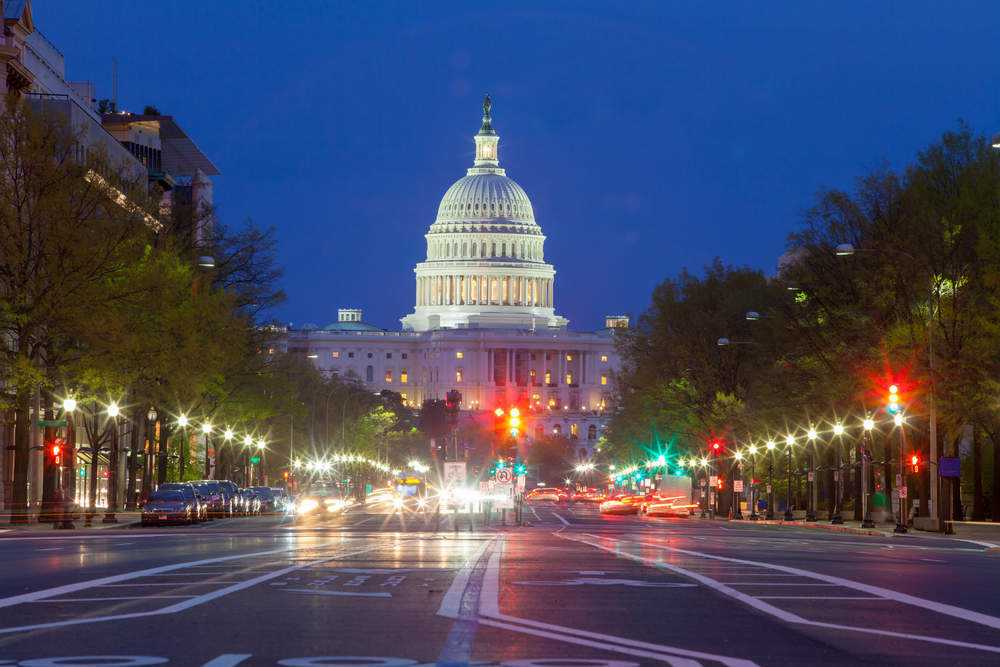
The US Senate has passed a budget agreement early this morning after the country began its second spending shutdown of 2018 at midnight (5am London time).
The two-year budget would boost federal spending by $300bn and suspend the debt ceiling for a year, however it now moves to the Republican-controlled House, where opposition from many Democrats and a faction of conservatives could derail the deal.
The latest US government shutdown comes after Congress missed a funding deadline, the second time US government funding expired in less than a month.
Rand Paul, a Republican senator from Kentucky, was responsible for forcing a delay in approving a budget deal last night.
Senators had been expected to vote on the budget on Thursday afternoon, so that it could be sent to the House for approval before midnight.
Paul opposed the measure because it would have raised the deficit and forced the Senate to delay the vote because Republican party leaders refused to allow debate on an amendment that would have chastised US president Donald Trump’s administration for being fiscally irresponsible.
How well do you really know your competitors?
Access the most comprehensive Company Profiles on the market, powered by GlobalData. Save hours of research. Gain competitive edge.

Thank you!
Your download email will arrive shortly
Not ready to buy yet? Download a free sample
We are confident about the unique quality of our Company Profiles. However, we want you to make the most beneficial decision for your business, so we offer a free sample that you can download by submitting the below form
By GlobalDataThe 650-page spending plan was only unveiled earlier this week, with details of the plan still unclear.
White House legislative affairs director Marc Short said the package would increase spending by “just shy” of $300bn.
The Washington Post puts the figure at $500bn.
The bill contains $165bn of additional defence spending and $131bn in domestic spending, including funding for healthcare, infrastructure and tackling the US opioid crisis, reports Reuters news agency.
What was said:
Paul angrily charged his fellow Republicans with fiscal profligacy.
Paul said:
I ran for office because I was very critical of President Obama’s trillion-dollar deficits. Now we have Republicans, hand in hand with Democrats, offering us trillion-dollar deficits. I can’t in all good honesty, in all good faith, just look the other way just because my party is now complicit in the deficits.
Are we to be conservative all the time or only when we’re in the minority?
It is not yet clear how public services will be affected today. The federal Office of Personnel Management said government operations would “vary by agency” and employees should “refer to their home agency for guidance on reporting for duty”.
Why it matters:
Trump is battling to take control of the legislature but is struggling to do so.
Democrats are angry the bill does not address immigration, with many demanding a provision to shield so-called Dreamers, young immigrants who entered the US illegally as children.
Senate Majority Leader Mitch McConnell said:
The president of the United States supports the bill and is waiting to sign it into law. I understand my friend and colleague from Kentucky does not join the president in supporting the bill. It’s his right, of course, to vote against the bill. But I would argue that it’s time to vote.
Earlier this week, Trump said he would “love to see” the US government shutdown if there was no deal on funding for his proposed US-Mexico border wall.
Background:
The drama was playing out against a backdrop of tumbling global stock markets.
The Dow Jones Industrial Average fell by more than 1,000 points for the second time this week while the benchmark S&P 500 index fell 3.75 percent Thursday — down more than 10 percent since its 26 January peak.
Turmoil on the US markets led to sell offs in Asia. In a volatile week for global investors, Japan’s Nikkei 225 index slid 2.8 percent, while China’s Shanghai Composite slumped by 4.1 percent.
The sell-off began last week after a solid US jobs report fuelled expectations that the Federal Reserve would need to raise interest rates faster than expected.
A US government shut down could lead to further uncertainty on global markets.







